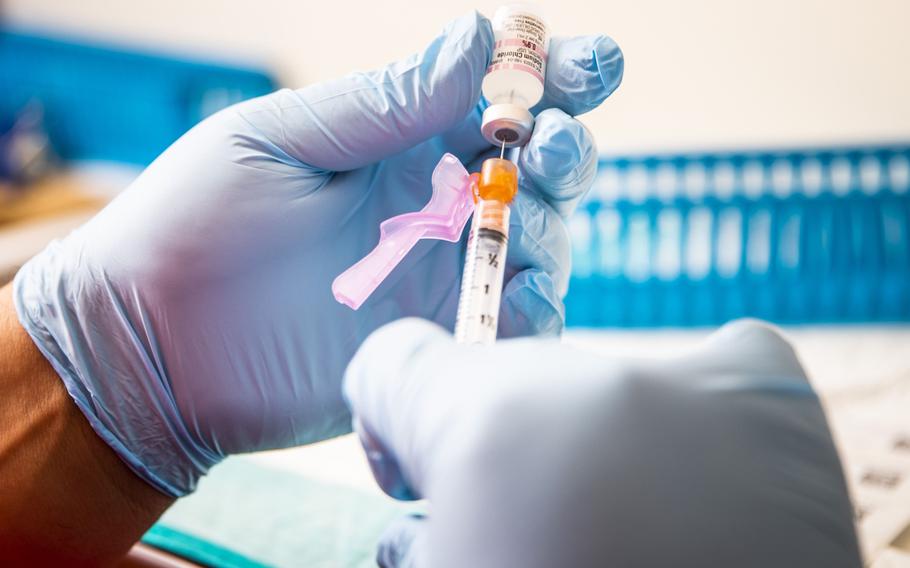
A healthcare worker prepares a vaccine in Boston on June 17, 2021. (Adam Glanzman/Bloomberg)
WASHINGTON — A federal advisory panel will discuss the need for additional coronavirus shots for patients with fragile immune systems at a meeting Thursday, amid growing concerns about waning immunity in vulnerable populations.
Members of the Advisory Committee on Immunization Practices, which makes vaccine recommendations to the Centers for Disease Control and Prevention, are expected to discuss an additional dose for immunocompromised patients.
These patients include U.S. adults who are organ transplant recipients, people on cancer treatments, and people living with rheumatologic conditions, HIV and leukemia. They are more likely to become seriously ill from COVID-19, the disease caused by the coronavirus and might more frequently spread the virus to others, experts say.
But the panel can't recommend additional shots or change clinical guidance until the Food and Drug Administration either gives full approval of the currently available vaccines, or amends its emergency use authorization. That authorization permits only a two-dose regimen of the Pfizer-BioNTech and Moderna vaccines, or a single dose of the Johnson & Johnson product.
The panel is also scheduled to hear additional information about an FDA warning issued July 12 about a serious but rare autoimmune disorder that has been linked to the Johnson & Johnson coronavirus vaccine. About 100 preliminary cases of Guillain-Barré syndrome, in which the immune system attacks the nerves, have been detected in vaccine recipients after the administration of 12.8 million shots in the United States, according to the CDC, which monitors vaccine safety systems with the FDA. Of those cases, 95 were serious and required hospitalization, and there was one death, according to the FDA.
The death was in a 57-year-old man with a past medical history of heart failure, stroke, hypertension and diabetes, who presented with weakness five days after his Johnson & Johnson vaccination and was later hospitalized, according to slides prepared by the FDA for the meeting. The man died 25 days after vaccination.
The cases have largely been reported about two weeks after vaccination and mostly in men aged 50 and older, the CDC has said. Most people fully recover from Guillain-Barré. Available data do not show a similar increased risk with the vaccines made by Moderna or Pfizer, with German partner BioNTech. More than 325 million doses of those two-dose vaccines — developed with different technology than what is used to make the Johnson & Johnson product — have been administered in the United States.
Medical experts say data is limited on whether an additional shot or booster confers a substantial increase in protection against the virus.
At a Senate panel hearing earlier this week, Anthony Fauci, the White House's chief coronavirus medical adviser and director of the National Institute of Allergy and Infectious Diseases, said immunosuppressed individuals "may actually need a boost as part of their initial regimen, in the sense of getting them up to the point where they are protected."
He and other health officials are making a distinction between boosters for people who already have an immune response after getting the shots, versus additional doses for immunocompromised people who fail to respond fully to the shots.
On June 23, the New England Journal of Medicine published results of a study of 101 organ transplant patients in France who received three doses of the Pfizer-BioNTech vaccine and found their rate of antibodies against the coronavirus was 4% after the first dose, 40% after the second dose and 68% after a third dose — showing the third dose dramatically increased the likelihood of developing a disease-fighting response.
For people who showed no protection after the second dose, 44% developed an antibody response after the third dose, according to the study.
Debate over the need for booster shots has intensified since Pfizer and BioNTech recently announced they would seek regulatory approval for a third inoculation for all eligible adults, not just the immunocompromised, amid rising global concern about the highly transmissible delta variant. The companies' announcement that they would seek an emergency-use authorization for a booster prompted health officials to declare that Americans who have been fully vaccinated do not need a third shot at this time.
Some panel members and the World Health Organization have also criticized the attention on boosters when so much of the world has little access to first doses. Low global vaccination rates and the spread of variants elsewhere in the world pose a risk for people in the United States.
Israel's Ministry of Health on July 12 began offering a third dose of the Pfizer-BioNTech coronavirus vaccine to severely immunocompromised adults in what health experts say could be the first phase of an experiment to provide coronavirus booster shots for older people and the most vulnerable. Britain has announced a plan for booster shots to begin in September, targeted first to groups that include people who are immunosuppressed, people older than 70 and front-line health-care workers.